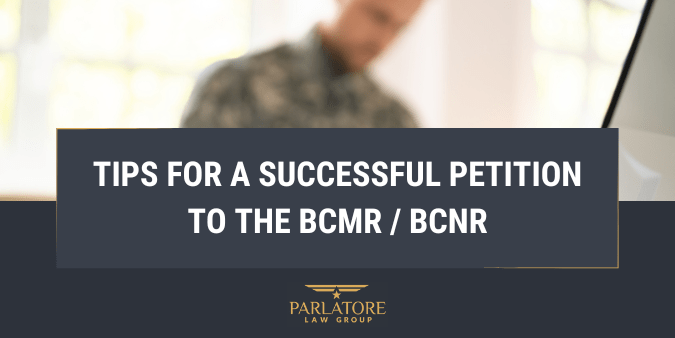Did you know that the majority of petitions to the BCMR/BCNR are denied? Simply filling out the required DD-149 form using space provided is rarely enough.
Boost Your Chances of Success with These Expert Tips:
1. Meet Your Burden to Provide Substantial Evidence:
You have the burden to overcome a “presumption of regularity” in official actions of public officers by providing substantial evidence of an error or injustice. This means the Board assumes everything the military did was proper; you must give them evidence to prove that it was not. The Board does not investigate to seek out evidence, so make sure your petition includes all necessary records and information. For instance, do not give them names of people they should speak with. Instead, obtain signed statements from people with relevant knowledge.
You also need to provide a detailed explanation of the error – don’t limit yourself to the small space in box 15 of the DD-149, you can attach additional pages. Be specific about what was required, what was not done, and how you were negatively affected. Documentation is crucial to prove your claim.
2. Address Relevant Standards, Criteria, and Guidelines:
Each Board follows service-specific regulations and/or instructions that set forth criteria for the Board to consider in granting or denying relief. For example, Section 723.3 of Title 32 of the Code of Federal Regulations, 32 C.F.R. § 723.3, governs applications to the BCNR. The AFBCMR must comply with Army Instruction 32-2603. There are also Memorandums from the Secretary and Under Secretary of Defense setting forth standards for all Boards of Correction. These are especially relevant if your request involves PTSD, TBI, or other mental health conditions. Apply the appropriate standards and criteria to explain why relief is warranted in your case.
If your request involves certain military orders or regulations that were not properly followed, cite them as specifically as possible in explaining the material error that occurred.
3. Exhaust Administrative Remedies:
Before the Board will consider your request, you must have exhausted all available administrative remedies. What this means, exactly, varies based on your specific case and military branch. For example, if you are seeking to upgrade a discharge occurring less than 15 years ago, you likely need to petition the Discharge Review Board first. If you a soldier looking to have unfavorable information removed from your OMPF, you generally need to petition the Department of the Army Suitability Evaluation Board (DASEB) before seeking a change from the Army BCMR. Or if you are contesting an issue with Defense Finance and Accounting Services, you may first need to appeal to the Defense Office of Hearing and Appeals (DOHA). Make sure you have taken all other available steps first, or your petition could be denied.
4. Anticipate Future Steps:
If your petition is denied, you may have options for further action. However, they all rely upon your initial submission, so it is crucial to get it right the first time.
If you can provide new evidence, you can request the BCMR / BCNR reconsider your petition. If you separated after December 19, 2019, and are seeking a discharge upgrade, you can appeal to the Discharge Appeal Review Board (DARB). If you do not have additional evidence or are seeking something other than a discharge upgrade, you can challenge the BCMR/BCNR decision in Federal District Court. With any option, it is crucial to present your strongest case from the start as you generally cannot add anything later in the process.
5. Consider hiring a lawyer:
Even if you are a capable and intelligent person with an understanding of the law, it can be difficult to clearly set forth your case, particularly because you are emotionally invested. Even lawyers hire lawyers. One of my clients was a lawyer who had spent years seeking a correction from the BCNR and PERS after he was awarded the wrong medal. He wrote the following:
“Liz, I am in tears. You have managed to do something I have been waiting 31 years to have corrected by the Navy. I cannot tell you how much I appreciate your help in bringing this matter to a conclusion in a way that truly honors my service during Desert Storm.”
Presenting the facts, evidence, and applicable law in writing and tying it all together in a way that clearly sets forth the error is an art not all lawyers master. Some law firms may use generic templates and boiler-place language without fully diving into the specific facts of your case. Hiring an attorney with experience in appellate law and petitions to the Boards can greatly increase the chances of a successful outcome for your petition.
To schedule a consultation with Elizabeth Candelario, contact us today.

